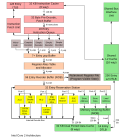In electronics, computer science and computer engineering, microarchitecture, also called computer organization and sometimes abbreviated as μarch or...
27 KB (3,576 words) - 18:07, 24 April 2025
processing unit (GPU) microarchitecture developed by Nvidia as the successor to the Hopper and Ada Lovelace microarchitectures. Named after statistician...
26 KB (1,721 words) - 19:30, 19 June 2025
launched on August 5, 2015, succeeding the Broadwell microarchitecture. Skylake is a microarchitecture redesign using the same 14 nm manufacturing process...
100 KB (4,901 words) - 14:28, 18 June 2025
Ampere is the codename for a graphics processing unit (GPU) microarchitecture developed by Nvidia as the successor to both the Volta and Turing architectures...
22 KB (1,237 words) - 04:42, 31 May 2025
The following is a partial list of Intel CPU microarchitectures. The list is incomplete, additional details can be found in Intel's tick–tock model,...
52 KB (2,899 words) - 00:13, 4 May 2025
The P6 microarchitecture is the sixth-generation Intel x86 microarchitecture, implemented by the Pentium Pro microprocessor that was introduced in November...
15 KB (1,545 words) - 12:10, 6 February 2025
Turing is the codename for a graphics processing unit (GPU) microarchitecture developed by Nvidia. It is named after the prominent mathematician and computer...
16 KB (1,122 words) - 08:13, 12 June 2025
Intel Core (section Broadwell microarchitecture)
Rocket Lake based on Cypress Cove is a CPU microarchitecture, a variant of Sunny Cove microarchitecture designed for 10 nm, backported to 14 nm. 1.25...
276 KB (9,895 words) - 17:34, 2 June 2025
Feynman is a microarchitecture for GPUs by Nvidia announced at Nvidia GTC in 2025 by CEO Jensen Huang. It is named after theoretical physicist Richard...
4 KB (188 words) - 10:28, 22 March 2025
is Intel's codename for the 14 nanometer die shrink of its Haswell microarchitecture. It is a "tick" in Intel's tick–tock principle as the next step in...
61 KB (3,111 words) - 19:34, 22 April 2025
Pascal is the codename for a GPU microarchitecture developed by Nvidia, as the successor to the Maxwell architecture. The architecture was first introduced...
23 KB (1,989 words) - 16:59, 24 October 2024
for a GPU microarchitecture developed by Nvidia, first introduced at retail in April 2012, as the successor to the Fermi microarchitecture. Kepler was...
28 KB (2,358 words) - 11:50, 25 May 2025
processing unit (GPU) microarchitecture developed by Nvidia. It is designed for datacenters and is used alongside the Lovelace microarchitecture. It is the latest...
19 KB (1,803 words) - 23:26, 25 May 2025
The Intel Core microarchitecture (provisionally referred to as Next Generation Micro-architecture, and developed as Merom) is a multi-core processor microarchitecture...
57 KB (3,500 words) - 01:59, 17 May 2025
Haswell is the codename for a processor microarchitecture developed by Intel as the "fourth-generation core" successor to the Ivy Bridge (which is a die...
109 KB (4,974 words) - 13:06, 17 December 2024
Tremont is a microarchitecture for low-power Atom, Celeron and Pentium Silver branded processors used in systems on a chip (SoCs) made by Intel. It is...
16 KB (534 words) - 09:21, 26 July 2024
Pentium (section P5 microarchitecture based)
into older CPU sockets. In parallel with the P5 microarchitecture, Intel developed the P6 microarchitecture and started marketing it as the Pentium Pro for...
41 KB (2,656 words) - 09:55, 8 March 2025
Rubin is a microarchitecture for GPUs by Nvidia announced at Computex in Taipei in 2024 by CEO Jensen Huang. It is named after astrophysicist Vera Rubin...
5 KB (258 words) - 10:28, 22 March 2025
Coffee Lake (redirect from Coffee lake (microarchitecture))
Intel's previous changes in product generations coincided with new microarchitectures, it was unclear but generally expected that the eighth Core generation...
55 KB (1,878 words) - 10:56, 18 June 2025
unit (GPU) microarchitecture developed by Nvidia, first released to retail in April 2010, as the successor to the Tesla microarchitecture. It was the...
14 KB (1,585 words) - 19:43, 25 May 2025
Ivy Bridge is the codename for Intel's 22 nm microarchitecture used in the third generation of the Intel Core processors (Core i7, i5, i3). Ivy Bridge...
65 KB (2,672 words) - 19:39, 9 June 2025
NetBurst (redirect from NetBurst (microarchitecture))
The NetBurst microarchitecture, called P68 inside Intel, was the successor to the P6 microarchitecture in the x86 family of central processing units (CPUs)...
16 KB (1,648 words) - 01:48, 3 January 2025
Sandy Bridge (redirect from Intel Sandy Bridge (microarchitecture))
Intel's 32 nm microarchitecture used in the second generation of the Intel Core processors (Core i7, i5, i3). The Sandy Bridge microarchitecture is the successor...
61 KB (2,688 words) - 19:44, 9 June 2025
Pentium 4 (section Microarchitecture)
until August 8, 2008. All Pentium 4 CPUs are based on the NetBurst microarchitecture, the successor to the P6. The Pentium 4 Willamette (180 nm) introduced...
45 KB (5,367 words) - 18:30, 26 May 2025
family of graphics processing unit microarchitectures developed by ATI Technologies/AMD and their second microarchitecture implementing the unified shader...
42 KB (3,116 words) - 13:48, 8 June 2025
The AMD Bulldozer Family 15h is a microprocessor microarchitecture for the FX and Opteron line of processors, developed by AMD for the desktop and server...
36 KB (3,748 words) - 19:04, 19 September 2024
Volta is the codename, but not the trademark, for a GPU microarchitecture developed by Nvidia, succeeding Pascal. It was first announced on a roadmap...
16 KB (1,056 words) - 03:17, 25 January 2025
microprocessors designed and sold by AMD, based on the company's Zen microarchitecture. Introduced in June 2017, they are specifically targeted for the server...
37 KB (4,178 words) - 23:30, 18 June 2025
Family 16h is a low-power microarchitecture designed by AMD. It is used in APUs succeeding the Bobcat Family microarchitecture in 2013 and being succeeded...
23 KB (1,049 words) - 22:43, 6 September 2024
Pentium (original) (redirect from Intel P5 (microarchitecture))
compatible line of processors, succeeding the i486, its implementation and microarchitecture was internally called P5. Like the Intel i486, the Pentium is instruction...
40 KB (3,895 words) - 13:11, 19 June 2025


















